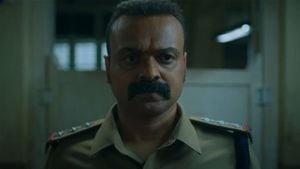Hundreds of thousands gathered on February 23, 2025, at Kamal Chamoun Sports City Stadium in Beirut, Lebanon, to pay their respects to Hassan Nasrallah, the former leader of Hezbollah, who was killed by Israeli airstrikes last September. This massive funeral ceremony has been recognized as the largest of its kind in Lebanon over the past two decades, illustrating the significant support Nasrallah commanded throughout his leadership.
The event saw not just local mourners but also prominent Iranian officials, including Speaker of Parliament Mohammad Bagher Ghalibaf and Foreign Minister Abbas Araqchi, among many others who traveled to show their solidarity. Nasrallah’s cousin and presumed successor, Hashim Safi al-Din, was also laid to rest during this ceremony, which was attended by dignitaries from around the region.
Scenes of mourning filled the stadium, with reports indicating the venue quickly reached full capacity as supporters from various regions, including southern Lebanon and the Bekaa Valley, flooded the area starting early. Outside the stadium, large screens were set up to allow those unable to enter to witness the proceedings.
Al-Jazeera reported speeches made at the ceremony, including remarks from Naeem Qassem, Hezbollah's deputy leader, who declared, "We will keep our trust and continue on this path, we will uphold your will. You are still with us: your path and struggle live within us." This statement was aimed at reinforcing Hezbollah’s resilience following the deaths of both Nasrallah and Safi al-Din.
Alongside the displays of grief and respect for Nasrallah, the backdrop of Israeli air force fighter jets flying overhead cast a dark shadow over the proceedings. Israel's Defense Minister Israel Katz stated, "A clear signal: to those who threaten to destroy Israel, there will be an end," highlighting the tense and hostile environment surrounding the event and the continuing conflict between the two sides.
The funeral proceedings, which took place under tightened security measures, were also accompanied by the mourning of the relationship between Hezbollah and its supporters, portraying the narrative of perseverance against what they view as foreign oppression.
Historically, Nasrallah has played a pivotal role within Hezbollah since he became the group's secretary-general in 1992 following the assassination of his predecessor, Abbas al-Musawi. His tenure was characterized by resistance against Israel and significant influence on both political and military strategies concerning Lebanon and broader regional dynamics.
Nasrallah's death was officially confirmed by the Israeli Defense Forces (IDF) shortly after the strike on his supposed headquarters on September 28, 2024. The strike was part of Israel’s prolonged military campaign aimed at diminishing Hezbollah's influence following the intense conflict between them. Reports indicated not only Nasrallah's assassination but also the elimination of other high-ranking figures within Hezbollah during this assault.
Following his death, both Russia and the United States reacted sharply. Russia's Foreign Ministry condemned the assassination, referring to it as yet another political killing carried out by Israel. Conversely, former U.S. President Joe Biden characterized the act as justified, citing Nasrallah’s long-standing record of terrorism against U.S. interests.
Now, with the leadership of Hezbollah transitioning to Naeem Qassem, former deputy leader, the organization faces the challenge of maintaining its stronghold over its base and countering the narrative propagated by Iran's adversaries. The impact of such high-profile funerals should not be underestimated, as they serve to galvanize support and unify public sentiment during times of strife.
The significance of the funeral and the massive public turnout reflect not only the legacy Nasrallah leaves behind but also the fervent spirit of resistance among his supporters. Hezbollah's leadership hopes to convey their message of resilience, stating their commitment to continue the movement he championed over three decades.
Indeed, the response to Nasrallah's killing has now become part of the broader strategy amid the continuing and intensified conflict with Israel. Observers will be watching closely to see how Hezbollah navigates this new chapter, and whether the outpouring of support seen at Nasrallah's funeral translates to sustained political and military presence on the ground.



